Protecting Your Child Through Vaccination: What Parents Need to Know
Getting your child vaccinated is an important, but sometimes challenging, decision. In this blog, I am sharing what you need to know about childhood vaccines. I created this safe space to help you make informed, loving choices for your child’s health.
TENDER LOVING CARE FOR MOMS & KIDS
Sheri Anne Maximille Cabañes
6/15/20257 min read


Note: This post is for informational purposes only and is not a substitute for professional medical advice. Please speak with your healthcare provider about your specific health concerns.
"OUCHY!" shouted my daughter during her annual flu shots in her pediatrician's clinic.
Her reaction to getting vaccinated has always been consistent. She would initially resist getting into the examination room because she knew she would be injected. After a few minutes of convincing, she would receive her shots, say "Ouchy!", and act as if nothing happened. My husband and I have always been amazed that she rarely cries during her vaccinations.
Aside from her reactions during her vaccination appointment, we are also thankful that she rarely gets sick. Just some runny nose and mild fever that usually resolves in a few days. When we mentioned this to her pediatrician, we agreed that following her vaccination schedule helped her develop a strong immune system.
As mothers, we always want what’s best for our kids. This is most especially true when it comes to their health. One of the most common decisions we face is whether or not to vaccinate. As a nurse and fellow mom, I hope to help give clarity and care about vaccinations without judgment.
In this blog post, I will discuss childhood vaccinations. I want to help parents make informed decisions about their children's health.
What are Vaccines?
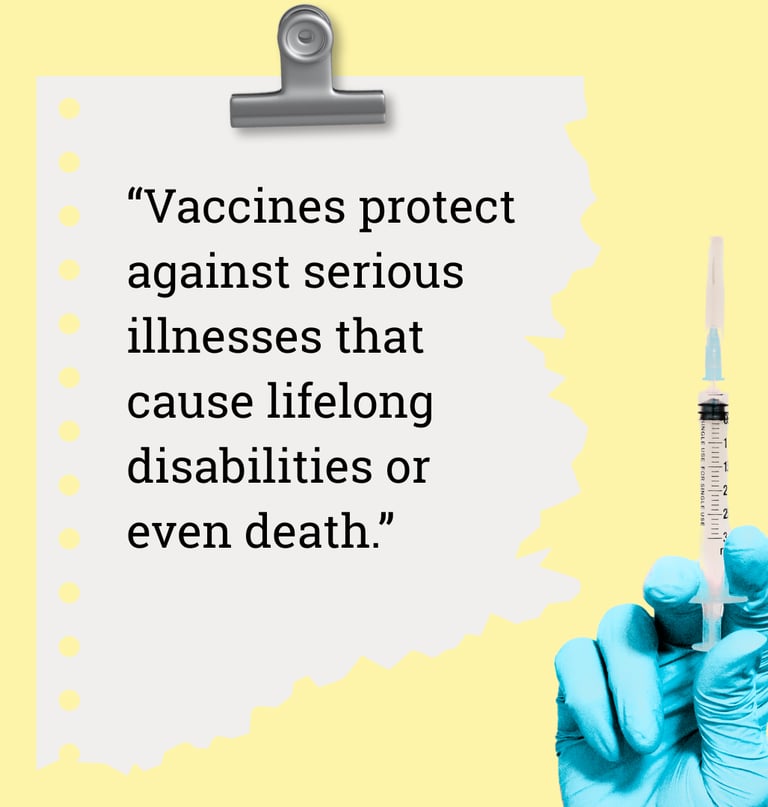

A vaccine is a preparation that contains weakened or inactive parts of disease-causing organisms. A vaccine is usually in the form of an injection, but there are also oral vaccines available. It is given to help the body recognize and fight infection without causing the actual illness. Vaccination is the procedure of giving a vaccine. In most cases, a qualified health professional administers the vaccine via injection.
Picture yourself in a practice drill during a self-defense or martial arts class. You are being trained to fight without actually fighting and getting hurt. So that one day, when you encounter a threat to your safety, you'll know how to defend yourself.
The same goes for vaccination. Vaccines train the immune system to fight harmful bacteria and viruses by showing them what they look like. So that one day, when the immune system encounters real bacteria and viruses, it can protect the body against them.
Vaccines protect against serious illnesses that cause lifelong disabilities or even death. Thanks to widespread vaccination programs, many of these diseases are now rare. Like the recent COVID-19 pandemic, which has now been prevented through vaccinations.
Are Vaccines Safe?
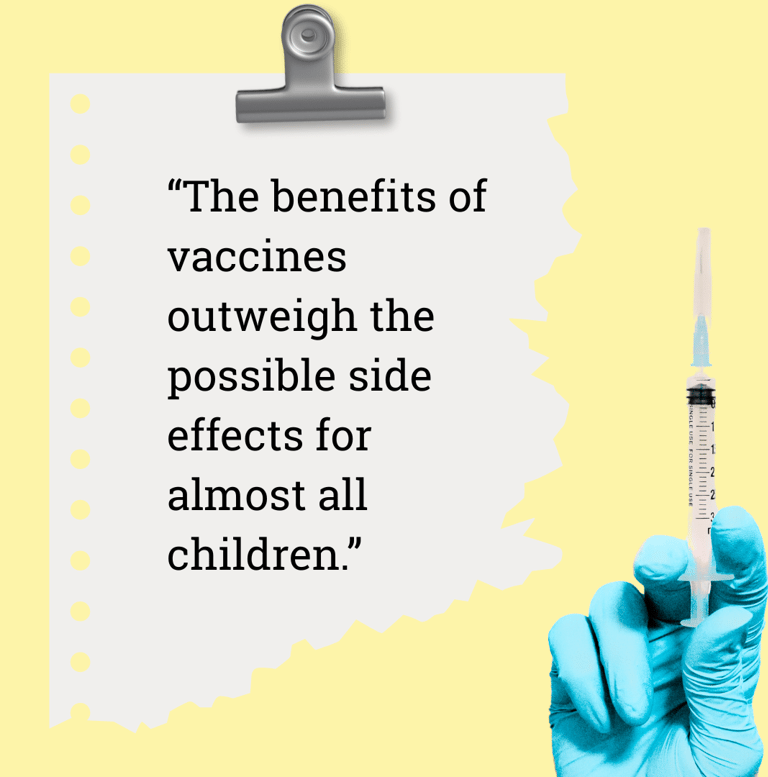

Many mothers are concerned about the safety of vaccines, which is completely understandable. As for the question of whether vaccines are safe, the honest answer is yes. Vaccines undergo a meticulous process of research, testing, monitoring, and approval before being administered to the public.
While vaccines have side effects, these are often mild and temporary. The most common side effects include a slight fever, muscle aches, headache, or pain, swelling, and redness at the injection site. These reactions may indicate that the immune system is responding to the vaccine appropriately.
Serious side effects, such as an allergic reaction and seizures, are extremely rare. If this occurs, bring your child to the nearest hospital so they can be given proper and immediate treatment. Healthcare providers are trained to recognize and manage any reactions. Vaccine safety is continuously monitored by health authorities worldwide.
Overall, the benefits of vaccines outweigh the possible side effects for almost all children.
Essential Childhood Vaccines
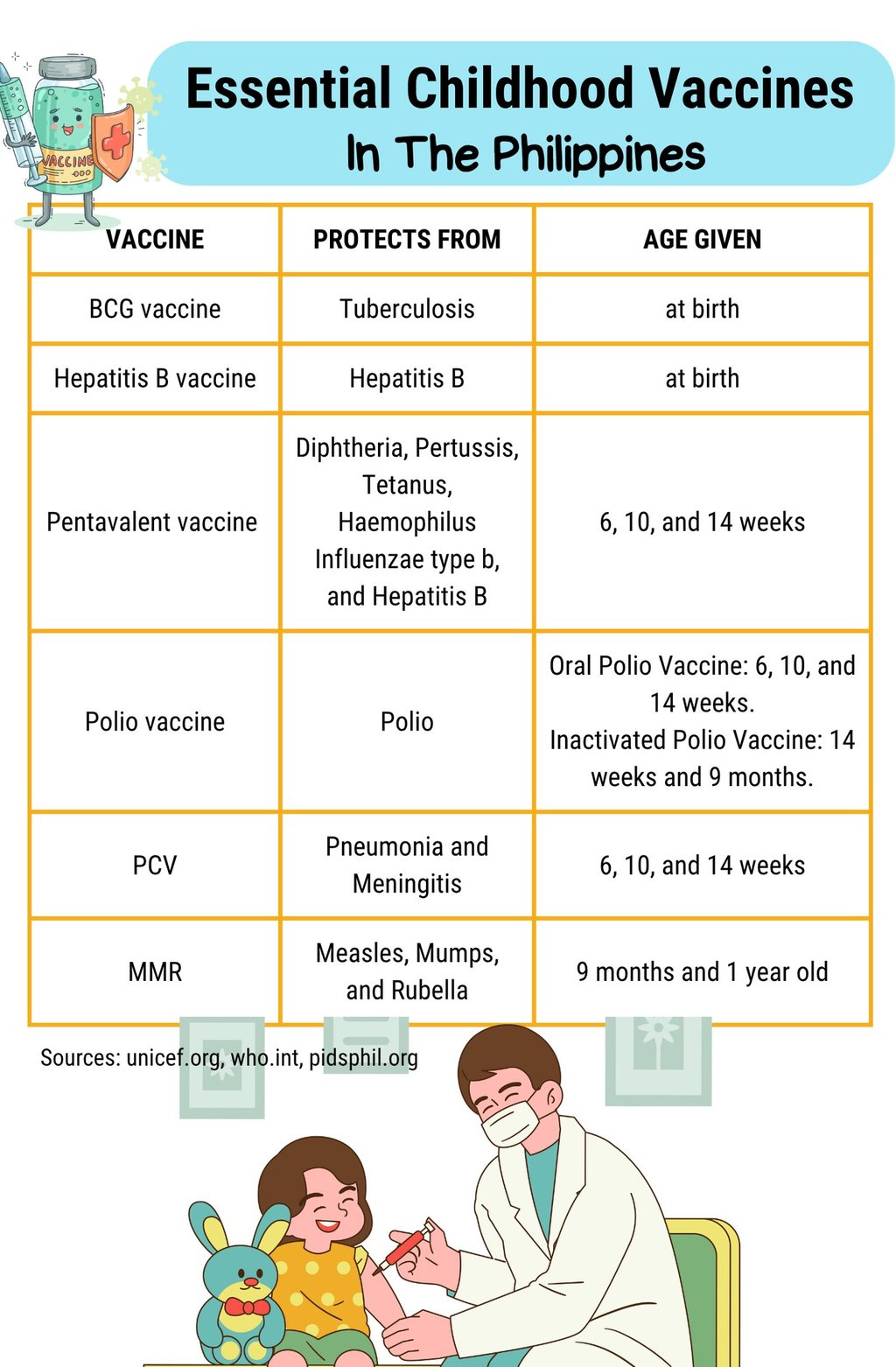

The World Health Organization recommends several core vaccines that protect against diseases. Most countries have health programs that provide free vaccines for children. You can also choose to get vaccines from private health clinics.
In the Philippines, the following routine vaccinations are available in public health centers and facilities:
1. BCG vaccine
Protects from tuberculosis.
Given at birth.
Tuberculosis (TB) is an infection that mainly attacks the lungs. In infants and young children, it affects other parts of the body, such as the brain, bones, joints and other internal organs (extrapulmonary or miliary tuberculosis).
2. Hepatitis B vaccine
Protects from Hepatitis B.
Given at birth.
Hepatitis B is a dangerous liver infection that can lead to chronic liver disease and liver cancer. It is given in many Asian countries, like the Philippines, with high hepatitis B rates.
3. Pentavalent vaccine
Protects from Diphtheria, Pertussis, Tetanus, Haemophilus Influenzae type b, and Hepatitis B.
Given at 6, 10, and 14 weeks.
Diphtheria infects the upper respiratory tract (nose, throat, tonsils) and the skin. The diphtheria toxin may obstruct the upper respiratory tract, making it hard for children to breathe and swallow. Severe cases can cause paralysis, heart failure, kidney failure, and sometimes death.
Pertussis (whooping cough) causes coughing spells that can last for weeks. It can lead to troubled breathing, pneumonia, and death.
Tetanus, commonly known as lockjaw, causes very painful muscle contractions in the neck and jaw. This can make it hard for children to open their mouths, swallow, breastfeed, or breathe. Tetanus is often fatal.
Haemophilus Influenzae type b (Hib) causes infection of the lining of the brain and spinal cord (meningitis) and the lungs (pneumonia). It causes serious illness or death in infants and young children. Hib bacteria can be transmitted to other humans via droplets from the mouth and nose.
4. Polio vaccine
Protects from poliovirus.
Oral Polio Vaccine is given at 6, 10, and 14 weeks.
Inactivated Polio Vaccine is given at 14 weeks and 9 months.
Polio is caused by a virus that affects the nerves in the spinal cord or brain stem. It can paralyze the limb muscles and the breathing muscles, which can lead to death. Polio is nearly eliminated worldwide, thanks to vaccination.
5. PCV
Protects from pneumonia and meningitis.
Given at 6, 10, and 14 weeks.
Pneumococcal diseases, such as pneumonia, meningitis, and blood infections, are dangerous for children under 2 years old because their immune systems are still developing.
6. MMR
Protects against Measles, Mumps, and Rubella.
Given at 9 months and 1 year old.
Before the measles vaccine, this disease claimed millions of young lives annually.
Measles is a highly infectious disease causing fever, runny nose, white spots in the back of the mouth, and a rash. Serious cases can cause blindness, brain swelling, and death. Measles alone killed over 140,000 people globally in 2018, mostly children under five years old.
Mumps is a viral infection that affects the salivary glands that produce saliva. It can cause headache, tiredness, fever, and painful swelling in the jaw. Complications may include meningitis, inflammation of the testicles, and hearing loss.
Rubella (German measles) in children and adults is usually mild. Symptoms include rashes, fever, cough, sore throat, headache, and joint pain. In pregnant women, rubella can cause miscarriage or infant death. Rubella can be transmitted from the pregnant mother to the fetus and can cause Congenital Rubella Syndrome. This affects newborns, causing birth defects in the eyes, ears, heart, and brain.
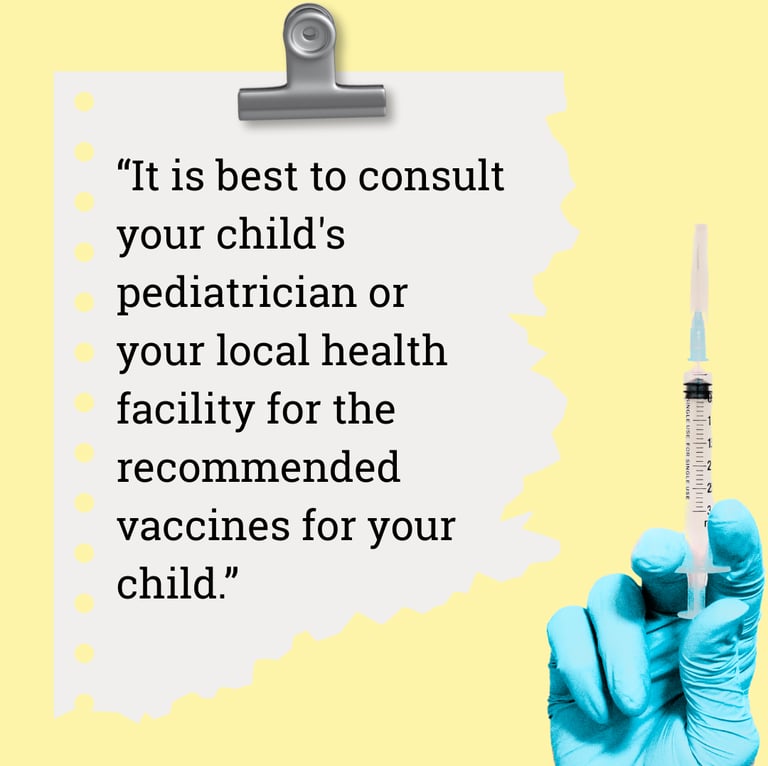

Is There A Recommended Vaccination Schedule?
Vaccination schedules vary by country depending on the common diseases in each country. It is best to consult your child's pediatrician or your local health facility for the recommended vaccines for your child. In case your child missed a vaccine schedule, they can also advise on how to catch up with the missed vaccines.
For references, you can check out the recommended vaccination schedules by the World Health Organization (WHO), the Centers for Disease Control and Prevention (CDC), and the Pediatric Infectious Disease Society of the Philippines (PIDSP).
The Community Connection
Vaccinating our children not only protects them but also everyone around them. Some children cannot receive vaccines due to certain conditions. These include newborns who are too young for certain vaccines, children receiving cancer treatment, and individuals with weak immune systems.
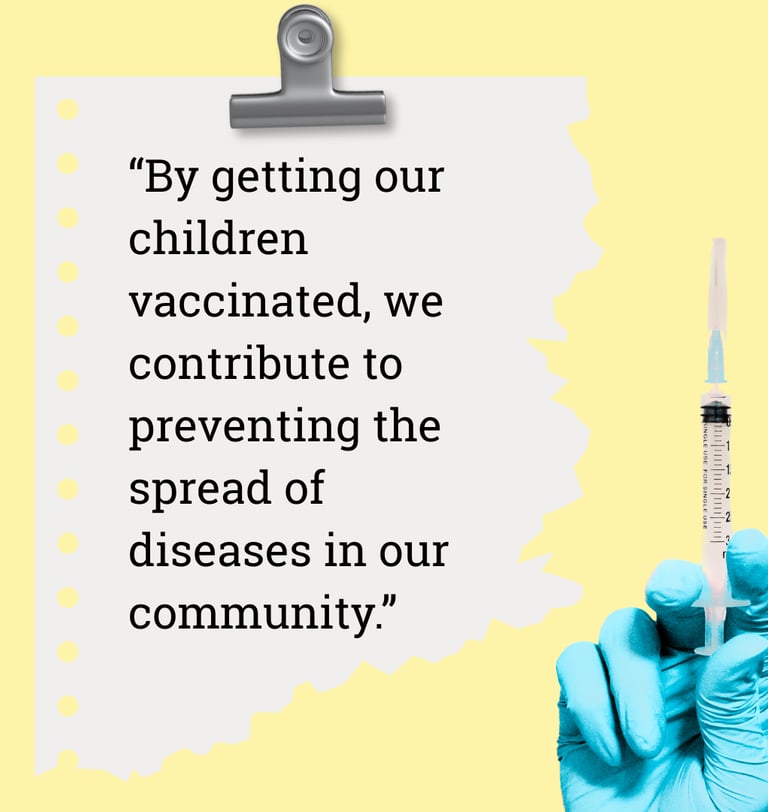

In communities with high vaccination rates, it becomes harder for diseases to spread. This creates a protective shield around the most vulnerable individuals, like newborns, the elderly, and even those with medical conditions that make their immune system weak. This collective protection, called herd immunity, has saved many lives and prevented the spread of diseases.
Vaccines do not just protect individuals- they protect communities too. By getting our children vaccinated, we contribute to preventing the spread of diseases in our community.
Making informed Decisions
As a nurse, I strongly encourage mothers to ask questions and seek reliable information. Asking questions before making decisions that would impact your child's health is part of being a responsible parent.
It's always best to discuss your concerns with your child's pediatrician or a healthcare professional in your local health unit. They can provide personalized advice based on your child's needs and health history, as well as the high-risk infectious diseases in your area.
Respecting Different Perspectives
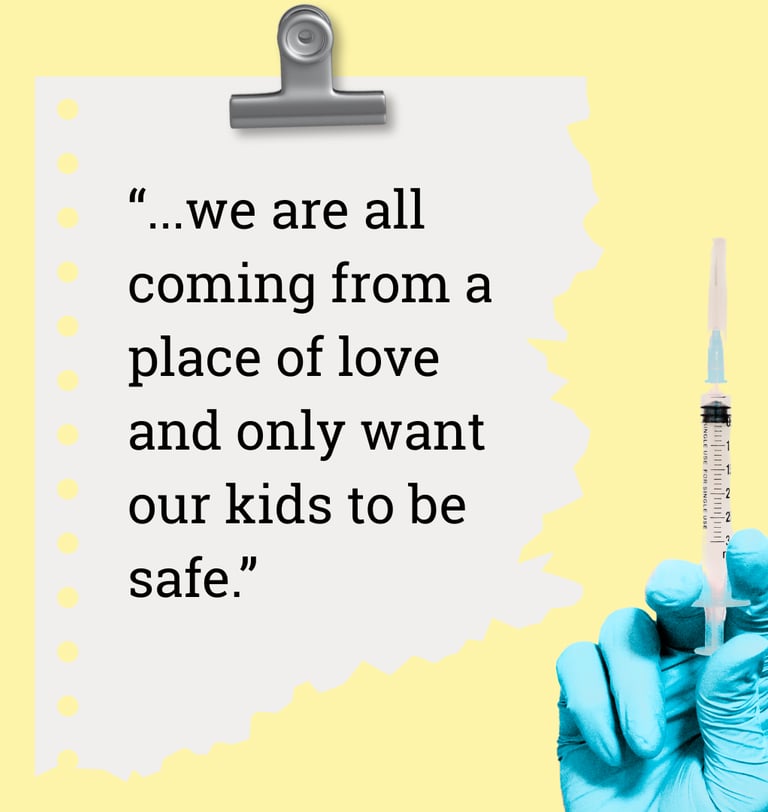

Despite the scientific evidence supporting the safety and health benefits of vaccination, I want to acknowledge that some parents have chosen to do otherwise.
I understand that choosing whether or not to have our children vaccinated can be a difficult decision. Parenting is complex and deeply personal. Each parent has different beliefs, experiences, and cultural backgrounds that influence decision-making.
For parents who have chosen not to vaccinate, I want you to know this space still holds you with respect. We may have different beliefs, but we are all coming from a place of love and only want our kids to be safe. 💕
Getting Your Child Vaccinated
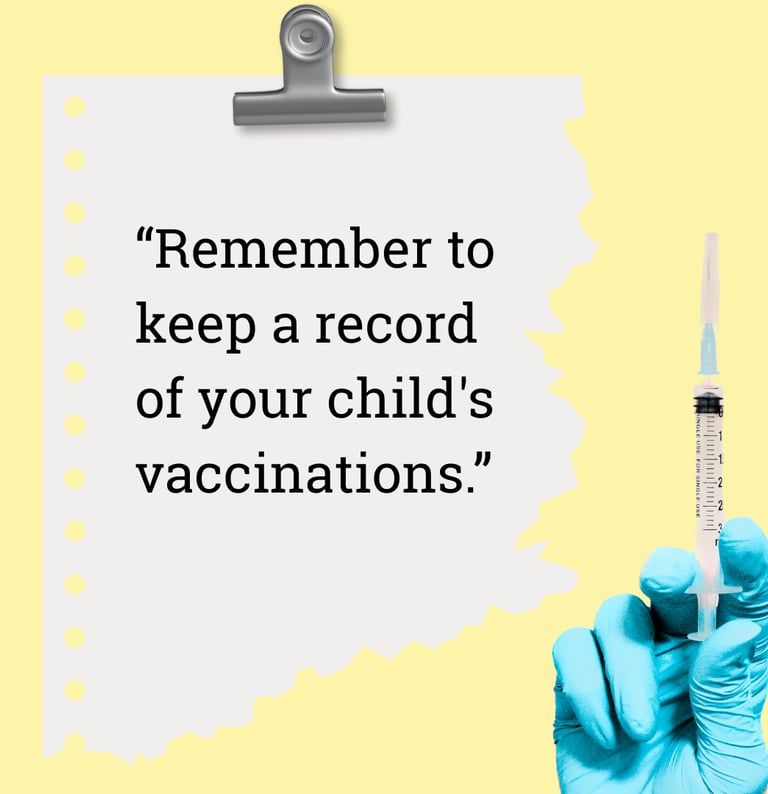

If you've decided to protect your child through vaccination, take action now. Contact your child's pediatrician or local healthcare provider to discuss the appropriate vaccine schedule for your child's age. They can also recommend ways to catch up, in case your child has missed some vaccinations.
Remember to keep a record of your child's vaccinations. This will be important for medical records, school enrollment, and travel.
💬Have questions or thoughts? Feel free to reach out to me through my contact page.
No judgments. This is a safe space for parents who want the best for their kids. ❤️
Disclaimer: This blog post is based on personal and professional experience and is intended for informational and educational purposes only. This is not a substitute for professional medical advice, diagnosis, or treatment. Always consult with your healthcare provider for specific questions or concerns regarding your health.
